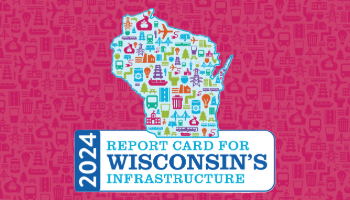On September 17th, the Wisconsin Section of ASCE released the 2024 Report Card for Wisconsin’s Infrastructure at the state capitol building in Madison. The Report Card evaluated 17 infrastructure categories, and Wisconsin’s infrastructure received a ‘C+’ grade, a one-step improvement over the 2020 Report Card. Twelve of the 17 categories evaluated on the Report Card received grades higher than the 2021 Report Card for America’s Infrastructure. The grades for each category are below.
| Grade | Categories |
| B | Hazardous Waste, Rail, Solid Waste |
| B- | Ports |
| C+ | Aviation, Bridges, Dams, Energy |
| C | Drinking Water, Roads, Stormwater |
| C- | Broadband, Inland Waterways |
| D+ | Transit, Wastewater |
| D | Public Parks |
| I (Incomplete) | Schools |
Highlights of the Wisconsin Report Card for 2024
Wisconsin is the first ASCE State Report Card to include a graded broadband chapter, which received a ‘C-’ grade. Due to its increasing importance, broadband has been deemed “the fourth utility,” following roads, water, and energy.
Broadband access and the electric grid that supports it remain a significant equity issue for Wisconsin families as our society transitions into more online-centered work and schooling environments. Wisconsin has a goal of universal broadband access by the year 2030. However, current funding for that project is more than $1 billion lower than the projected cost to finish that project.
The Wisconsin Infrastructure Report Card also examined the impact the Infrastructure Investment and Jobs Act (IIJA) is having on the state, especially its roads and bridges. The IIJA has provided more than $2 billion in funding for the state’s surface transportation systems.
Roads in Wisconsin received a ‘C’ grade, an increase from a ‘D+’ in 2020. The Report Card found that roads in Wisconsin are meeting the state’s goals for pavement conditions. However, Wisconsin drivers lose nearly two billion dollars a year in lost time and wasted fuel because of traffic backups. Additionally, drivers in the Milwaukee and Madison area spend more than 40 hours a year stuck in traffic.
The ‘C+’ grade for Wisconsin’s bridges is the same as in 2020. The Report Card found the rate of improvement for the state’s bridge inventory has stalled, and in 2023, 6.3% of bridges had a major structural component in “poor” condition, which is slightly ahead of the national average of 6.5%. While improvement is recommended, poor condition ratings do not mean a structure is unsafe, but they require significant maintenance or replacement.
Also new to this year’s Report Card are assessments of the state’s public parks and schools. Schools had not previously been evaluated in the Infrastructure Report Card. Unfortunately, there is not enough information to provide an accurate assessment of the schools based on current conditions, which earned the category an ‘I’ for incomplete.
Parks earned a ‘D’ grade, in part due to the neglect of infrastructure in state and local parks stemming from reductions in government funding at all levels. Contamination from “forever chemicals” or PFAS in drinking water sources has created a challenge regarding water supply and wastewater concerns at state parks, and additional revenue is needed to address such issues.
Wisconsin’s 2024 Report Card Release Event
At the release event, leaders heard from Report Card Chair Ken Mika, P.E., and Co-Chair Zoey Meyers, EIT, about the report card’s findings. They also heard from Debby Jackson from the Wisconsin Transportation Development Association and Eric Dundee from the Madison Metropolitan Sewerage District about the importance of good infrastructure for Wisconsinites.
We’d like to thank all the ASCE members who contributed their time and energy to the Report Card. Their hard work over the last year will help ASCE members in their advocacy for infrastructure at all levels of government.
The 2024 Report Card for Wisconsin’s Infrastructure Committee includes
Committee Co-Chairs
- Ken Mika
- Zoey Meyers
Editing and Logistics Support
- Carl Sutter
- Darrell Berry
- David Sonne
- Martin Hanson
Authors/Contributors
Category leads are listed in bold.
Aviation
- Ryan Betker
Bridges
- Tony Castle
- Josh Mitchell
Broadband
- Vik Verma
Dams
- Seth Johnson
- Warren Hayden
- Uriah Monday
Drinking Water
- Justin Bilskemper
Energy
- Greg Shroeder
- Bill Kralj
- Bruce Ramme
- Blaine Wruck, PE
Hazardous Waste
- Carol Diggelman
Inland Waterways
- Michael Schwar
Ports
- Craig Harley
Public Parks
- John McCarthy
Rail
- Joanna Bush
Roads
- Madison Anderson
Schools
- Brian Udovich
- Crystal Strait
Solid Waste
- Carol Diggelman
Stormwater
- Jake Brunoehler
Transit
- Bob Bryson
- Jesse Jefferson
Wastewater
- Jen Hurlebaus
- Laura Gerold
